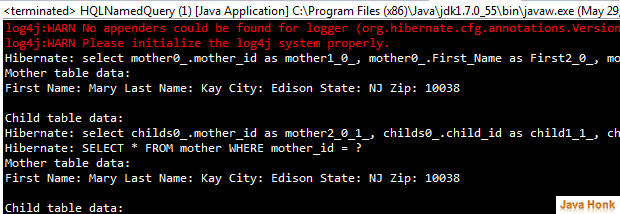Hibernate Named Query
Hibernate named SQL queries can be defined in mapping file or as annotation and called in same way as named HQL query. Below are examples:
Note: This demo is extension of previous tutorial. If you are interested to see full working example with all set up please refer this tutorial Hibernate One To Many Annotation Example
- Using HQL annotation:
@NamedQueries({ @NamedQuery(name = "findMotherNameById",
query = "from Mother where mother_id = :mother_id") })
- Using Native SQL annotation:
@NamedNativeQueries({ @NamedNativeQuery(
name = "findMotherNameByIdUsingNativeSQL",
query = "select * from Mother where mother_id = 1",
resultClass = Mother.class) })
- Using HQL XML mapping:
<query name="findMotherNameById"> <![CDATA[from Mother where mother_id = :mother_id]]> </query>
OR
<query name="findMotherNameById2"> from Mother where mother_id = :mother_id </query>
Using Native SQL XML mapping:
<sql-query name="findMotherNameByIdUsingNativeSQL"> <return alias="mother" class="com.javahonk.bean.Mother" /> SELECT * FROM mother WHERE mother_id = :mother_id </sql-query>
OR
<sql-query name="findMotherNameByIdUsingNativeSQL2"> <return alias="mother" class="com.javahonk.bean.Mother" /> <![CDATA[select * from mother where mother_id = :mother_id]]> </sql-query>
- Complete java code example:
package com.javahonk; import java.util.Iterator; import java.util.List; import java.util.Set; import org.hibernate.Query; import org.hibernate.Session; import org.hibernate.SessionFactory; import com.javahonk.bean.Child; import com.javahonk.bean.Mother; import com.javahonk.util.HibernateUtil; public class HQLNamedQuery { static SessionFactory sf = HibernateUtil.getSessionFactory(); public static void main(String[] args) { Session session = sf.openSession(); session.beginTransaction(); //Named query - HQL example Query query = session.getNamedQuery("findMotherNameById"); query.setString("mother_id", "1"); List<Mother> moList = query.list(); for (Mother mother2 : moList) { System.out.println("Mother table data:"); System.out.println("First Name: "+mother2.getFirstName() +" Last Name: "+mother2.getLastName()+" City: " +mother2.getCity()+" State: "+mother2.getState() +" Zip: "+mother2.getZip()+"\n"); System.out.println("Child table data:"); Set<Child> childs=mother2.getChilds(); for (Iterator<Child> iterator = childs.iterator(); iterator.hasNext();) { Child child3 = (Child) iterator.next(); System.out.println("First Name: " +child3.getFirstName()+" Last name: " +child3.getLastName()+"\n"); } } //Named query - Native SQL example query = session.getNamedQuery( "findMotherNameByIdUsingNativeSQL"); query.setString("mother_id", "1"); moList = query.list(); for (Mother mother2 : moList) { System.out.println("Mother table data:"); System.out.println("First Name: "+mother2.getFirstName() +" Last Name: "+mother2.getLastName()+" City: " +mother2.getCity()+" State: "+mother2.getState() +" Zip: "+mother2.getZip()+"\n"); System.out.println("Child table data:"); Set<Child> childs=mother2.getChilds(); for (Iterator<Child> iterator = childs.iterator(); iterator.hasNext();) { Child child3 = (Child) iterator.next(); System.out.println("First Name: " +child3.getFirstName()+" Last name: " +child3.getLastName()+"\n"); } } session.getTransaction().commit(); session.close(); } }
Output:
For more information about HQL please read this hibernate official tutorial

